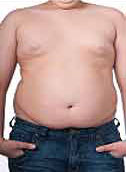- Could Artificial Sweeteners Be Aging the Brain Faster?
- Techniques for Soothing Your Nervous System
- Does the Water in Your House Smell Funny? Here’s Why
- Can a Daily Dose of Apple Cider Vinegar Actually Aid Weight Loss?
- 6 Health Beverages That Can Actually Spike Your Blood Sugar
- Treatment Options for Social Anxiety Disorder
- Understanding the Connection Between Anxiety and Depression
- How Daily Prunes Can Influence Cholesterol and Inflammation
- When to Take B12 for Better Absorption and Energy
- Epsom Salts: Health Benefits and Uses
Many Obese Teens Don’t Think They’re Fat, Study Shows


A growing number of overweight and obese American teens don’t think they have a weight problem, a new study shows.
The finding is cause for concern because people have to admit they have a weight issue before they take action, the researchers noted.
“Becoming conscious of one’s excess weight is the precursor to adopting behavioral changes necessary for appropriate weight control,” wrote lead investigator Dr. Jian Zhang, an epidemiologist from the College of Public Health at Georgia Southern University.
His team analyzed data from thousands of youths aged 12 to 16 between 1988-1994 and 2007-2012 as part of the U.S. National Health and Nutrition Examination Survey.
After accounting for factors such as age, race/ethnicity, gender and family income, the likelihood of overweight or obese teens who acknowledged having a weight problem fell 29 percent from 1988-1994 to 2007-2012.
Weight misperception was highest among whites and lowest among blacks.
One possible reason for the finding is that people tend to compare themselves with others. The more overweight friends teens have, the more likely they are to have a positive opinion of their weight, according to the researchers.
Other possible factors: teens undergo significant changes in body appearance during puberty, definitions of overweight and obesity have changed over time, there is less social pressure on teens about weight, and there is less mental distress among teens about weight, the researchers said.
The study was published online recently in the American Journal of Preventive Medicine.
“The declining tendency of correctly perceiving overweight status presents a vast challenge to obesity prevention among adolescents, making the overweight and obese adolescents less motivated to actively engage in effective weight-loss behaviors,” Zhang and his colleagues said in a journal news release.
New approaches are needed to motivate and help overweight and obese teens lose weight, the researchers said.
More information
The U.S. Office of Disease Prevention and Health Promotion explains how to keep children at a healthy weight.
Source: HealthDay
Copyright © 2026 HealthDay. All rights reserved.










